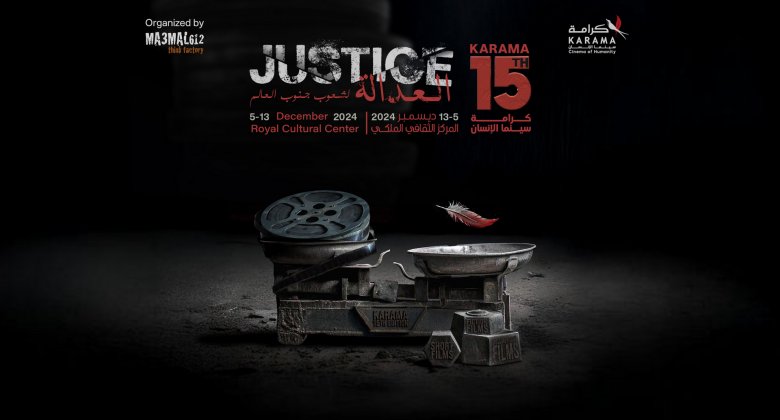
Amman –
On December 5, 2024, the 15th edition of the "Karama Human Rights Film Festival" will kick off at the Royal Cultural Center in Amman. Organized annually by "Ma3mal 612 Think Factory" in collaboration with the Ministry of Culture.
Under this year’s theme “Justice for the people of the global south” over 80 films have been selected, across different genres: short and long narrative, documentary, and animated films will compete, as the organizers of Karama which was established in 2010 emphasise that the focus of the new edition focuses on the dynamics between the Global North and South. Justice is presented as "a profound and overarching concept pursued by freedom-seekers everywhere, serving as a foundation for building bridges between the world's regions, peoples, systems, and activists , and importantly the ethics of real democratic dialogue. For Justice is the measure that defines whether the relationship between the North and South is one of contradiction or complementarity."
Justice, as described by festival director and renowned filmmaker Sawsan Darwaza, is a goal that "the people of the Global South aspire to achieve." She observes that the world has become "alarmingly divided into two halves: a northern half unwilling to relinquish its old colonial inclinations, which should have been eroded by the passage of time, and a southern half ravaged by wars, greed, and a persistent drive to break free from dependency."
Darwaza emphasizes that Karama aims to be a "central platform, not just for showcasing films but also for engaging more deeply and impactfully with global human issues." This includes highlighting the challenges facing the Global South, empowering youth, supporting digital cinema, and fostering discussions about social justice.
Reflecting on the state of the world "14 months after the genocidal war against the people of Gaza," Darwaza expresses her shock and dismay at how a "small fascist entity" has been allowed to "dominate the choices of the entire planet." She criticizes this rogue entity for its blatant disregard of international humanitarian law and ethical standards that are supposed to govern global relations, and for its failure to adhere to the collective agreements of humankind aimed at achieving global justice.
Darwaza concludes by announcing a press conference to be held at 5:00 PM on Thursday, November 28, 2024, where the festival team will share more details about the 15th edition, its films, and its activities.
Meanwhile, the festival’s artistic director, esteemed filmmaker Ehab Al-Khatib, believes that this edition has the potential to "make a real difference in driving change." He emphasizes that "merging innovative ideas with collaboration between filmmakers, audiences, and activists will strengthen Karama's humanitarian message and amplify its role in promoting the enlightening power of cinema on human issues worldwide."
"The scales are imbalanced," says Al-Khatib, "and they must be adjusted. Humanity must stand up for the region's causes, challenges, and aspirations for freedom, dignity, and fairness." He sees cinema as "and act of resistance for true human values" and stresses the importance of highlighting the modus operandi and living spirit of justice through cinema.
This year’s edition features over 80 films—narrative and documentary, short and long—centered on the struggles and aspirations of the peoples of the Global South. The participating films will compete for several awards, including, Best Short Film, the Audience choice Award, and the Best Human Rights Film Award, the latter of which is traditionally funded by the Arab Network for Human Rights Films (ANHAR).
According to the festival organizers, this year’s entries come from countries including Palestine, Lebanon, Bahrain, Syria, Jordan, Qatar, Morocco, Turkey, Norway, the Netherlands, the United States, Australia, Portugal, France, and others. Additionally, films from countries participating for the first time, such as Bangladesh and Ecuador, will be featured, showcasing works of global excellence.
Given the challenging circumstances in Palestine, Lebanon, and Yemen, Karama will host this year’s editions of Karama Palestine, Karama Yemen, and Karama Beirut festivals. It will also present Sudanese films produced in the diaspora and Syrian films created "outside the frame." Sudanese and Syrian films will be followed by evaluative and critical discussions featuring filmmakers, media professionals, and experts
Source


